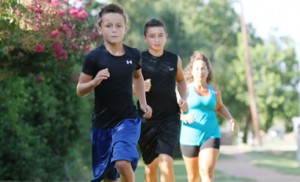 By Sophia Breene
By Sophia Breene
Many people hit the gym or pound the pavement to improve cardiovascular health, build muscle, and of course, get a rockin’ bod, but working out has above-the-neck benefits, too. For the past decade or so, scientists have pondered how exercising can boost brain function. Regardless of age or fitness level (yup, this includes everyone from mall-walkers to marathoners), studies show that making time for exercise provides some serious mental benefits. Get inspired to exercise by reading up on these unexpected ways that working out can benefit mental health, relationships and lead to a healthier and happier life overall.
More from Greatist:
Know Before You Go: Bikram Yoga
Super Picky Eater? It Could Be Genetic
34 Healthy Passover Recipes
1. Reduce Stress
Rough day at the office? Take a walk or head to the gym for a quick workout. One of the most common mental benefits of exercise is stress relief. Working up a sweat can help manage physical and mental stress. Exercise also increases concentrations of norepinephrine, a chemical that can moderate the brain’s response to stress. So go ahead and get sweaty — working out can reduce stress and boost the body’s ability to deal with existing mental tension. Win-win!
2. Boost Happy Chemicals
Slogging through a few miles on the ‘mill can be tough, but it’s worth the effort! Exercise releases endorphins, which create feelings of happiness and euphoria. Studies have shown that exercise can even alleviate symptoms among the clinically depressed. For this reason, docs recommend that people suffering from depression or anxiety (or those who are just feeling blue) pencil in plenty of gym time. In some cases, ex
ercise can be just as effective as antidepressant pills in treating depression. Don’t worry if you’re not exactly the gym rat type — getting a happy buzz from working out for just 30 minutes a few times a week can instantly boost overall mood.
3. Improve Self-Confidence
Hop on the treadmill to look (and more importantly, feel) like a million bucks. On a very basic level, physical fitness can boost self-esteem and improve positive self-image. Regardless of weight, size, gender or age, exercise can quickly elevate a person’s perception of his or her attractiveness, that is, self-worth. How’s that for feeling the (self) love?
Continue reading →
 The Daily Herald Newspaper posted this good advise on August 25, 2014:
The Daily Herald Newspaper posted this good advise on August 25, 2014:










